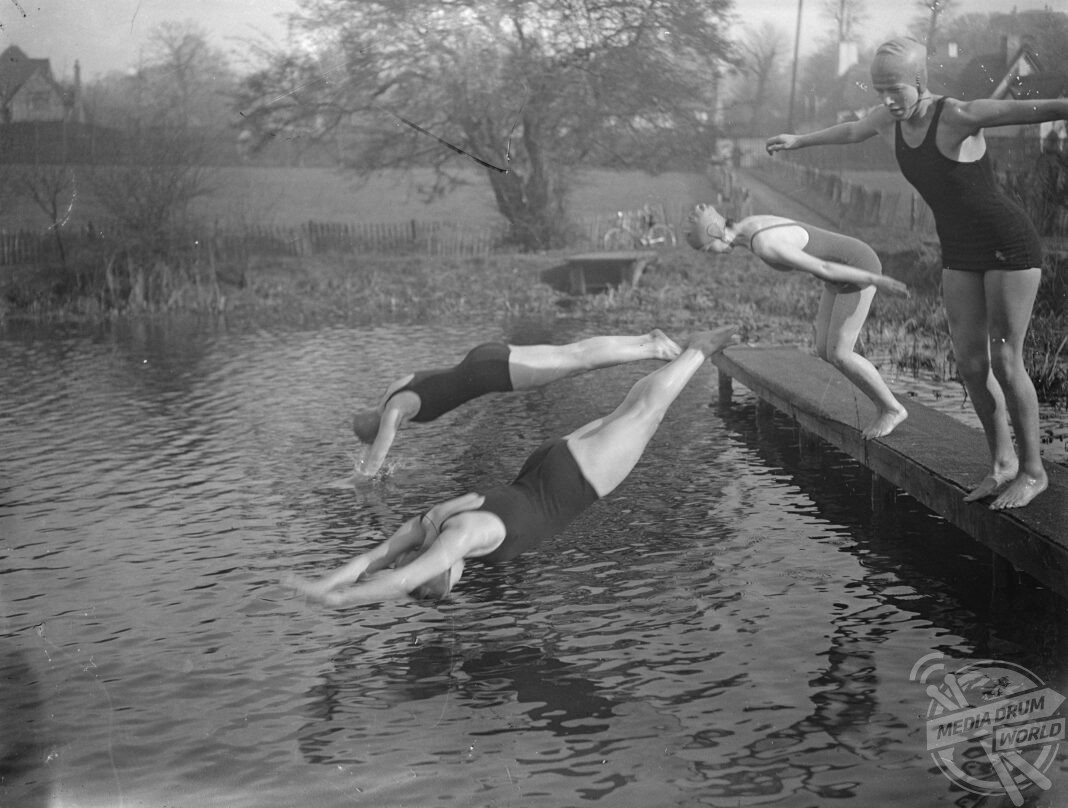By Aimee Braniff Cree
**WITH FULL PERMISSIONS**
COLOURISED IMAGES show our hardy ancestors plunging into freezing UK waters during some of the nation’s coldest winters.
Images show everything from 22 men competing in the annual Christmas Day swimming race in Serpentine in 1937 to hardy girl bathers daring the ice of Hampstead’s Ponds in 1932.

On Saturday, February 18, 1933 Halifax Town reached the fifth round of the FA Cup for the first time a blizzard then blew into Town’s faces and Luton took the lead before the referee halted the game. Twenty five minutes later the game restarted on two inches of snow.
In the second half Luton didn’t have the blizzard to contend with as Town had done and doubled their advantage. There were no further goals and Town’s momentous cup run was over.
The frost which began on December 27, 1939, and continued with few intermissions until about February 18, 1940, was the most severe in Great Britain since 1895. December 1939 was cold on the whole, the average temperature of 37·8° F.
Cold water swimming, also known as winter swimming or ice swimming, involves immersing oneself in water that is typically between 0°C to 10°C (32°F to 50°F) in temperature.
While it may sound daunting to jump into such cold water, there are actually many benefits to be gained from this practice.
Benefits include:
Boosts immune system – Cold water swimming has been shown to boost the immune system by increasing the production of white blood cells.
Increases circulation – Cold water causes blood vessels to constrict, which can help increase circulation and oxygenation throughout the body.
Reduces inflammation – Cold water can help reduce inflammation, which can help alleviate pain and promote healing.
Increases metabolism – Cold water exposure has been shown to increase metabolism, which can help with weight loss and management.

Enhances mental clarity – 1 Cold water immersion a week has been shown to improve mental clarity, focus, and alertness.
Improves mood – Cold water swimming can help reduce stress and anxiety and increase feelings of well-being and happiness. The post-swim elevated mood is real and often lasts all day.
Relieves pain – Cold water can help alleviate pain and soreness in the muscles and joints, making it a popular therapy for athletes and those with chronic pain conditions.
Relieves stress and anxiety – The number of cold water enthusiasts who do it solely for the benefits to their mental health is staggering.
Increases focus and concentration – One possible reason for this effect is the release of norepinephrine. This is a hormone produced by the adrenal gland that has been shown to improve focus and mental alertness.
Increases alertness – Cold water can improve your alertness.
Cold water swimming can improve blood pressure and fat levels in the blood when practised regularly by those in good general health.
However, if you have a heart condition, there are risks you should consider and discuss with your doctor or nurse specialist before starting swimming.
ENDS










